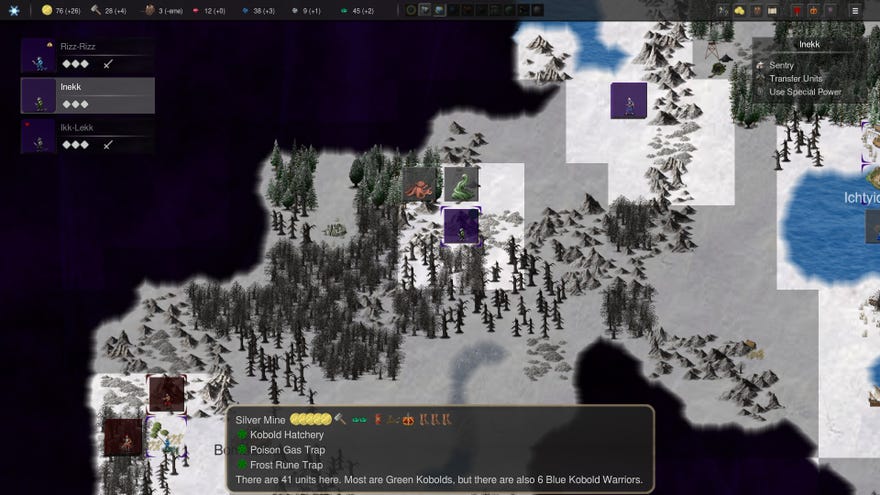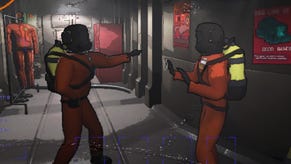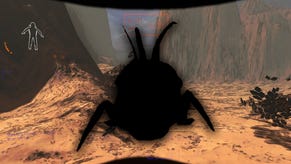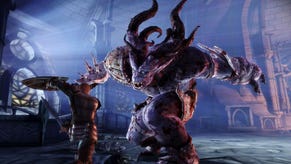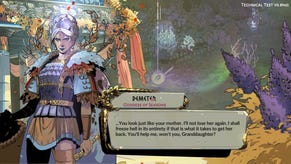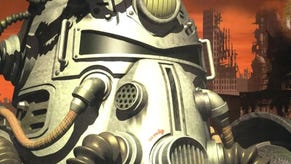The Rally Point: Conquest Of Elysium 5 smuggles roleplaying into strategy turf
Hesiod one out
It's near impossible to describe Conquest Of Elsyium 5 without contrasting it to Dominions 5, the expansive god-creating strategy series also by Illwinter. Their release history has intertwined since the 90s, and both series share common concepts and many, many unit types.
In fact, I've always somewhat overlooked the series, not really understanding what it was. That was definitely a mistake.
It's typically lazy and unhelpful to say "if you liked that you'll like this", but Conquest Of Elysium is a series defined by iteration. If you've played 3 or 4, you pretty much know how 5 goes already. This time around there's basically more of everything, and a heap of changes too esoteric to list, but fundamentally it's the same game as ever. Each player (or AI) picks from a range of mythological/fantasy factions and sets out from their starting citadel looking to conquer a procedurally generated world using a combination of soldiers, summoned creatures, and magical spells. Although presented like a 4X, there's almost no building, no research or diplomacy. You explore, gather resources, and raise as much force as possible to kill off your enemies before they get you first.
The biggest things marking it out are its sheer amount of stuff, and the huge differences between how factions play. Like the Bakemono, a tribe of diminutive, screeching mountain oafs who can recruit clutches of poorly armed goblins with gold, some larger, more imposing ones decked out like samurai for an extra cost in iron, and big ogrous brutes one by one.
But each individual creature is an independent unit. Recruiting a batch of 15 gives you not one abstract token, but 15 individuals to split up as you like. Assign them to a leader and they'll become an army, along with anything else under that leader. Give a shaman 20 spears, 15 archers, and oh, I dunno, 3 o-baks and the armoured 7 dai-baks left from that siege. Bring the blind one as well, might as well give him a good death. Each of the thousands of creatures you, your rivals, and the neutral wandering AI forces bring into the world is tracked in detail. They get stronger through experience, weaker through injuries, and become further empowered or plain warped by magic items. Even trees count as temporary units with appropriate attributes.
"A lot of the battle is in analysing the enemy, not telling every crossbowman in turn which goblin's bollock to shoot off."
This sounds like micromanagement hell, but another reason Elysium stands out is that you have no influence whatsoever over battles. Whenever opposing forces meet, a turn-based battle goes on until one side is annihilated. The only control you have is who's there, and what spells your mages prepare beforehand. It takes some getting used to, but what's frustrating at first becomes where its unique strategising works best. You can't possess every soldier, unfairly turning a group of dullwits into a perfectly co-ordinated force. You have to work with what you've got, learn how they're going to act, and organise your forces to make the most of that. A lot of the battle is in analysing the enemy and deciding which forces to leave behind, not telling every crossbowman in turn which goblin's bollock to shoot off.
Creatures have vastly different power levels and degrees of utility, contributing massively to each faction's unique playstyle. Most players will probably hire a few human spearmen or archers at some point, but the bulk of your forces will be unique to your faction, as will the magic your spellcasters have access to. Trolls will use goblins and various giant brutes, enchanters will hide behind automatons, and cultists will lead with insane fishmen.
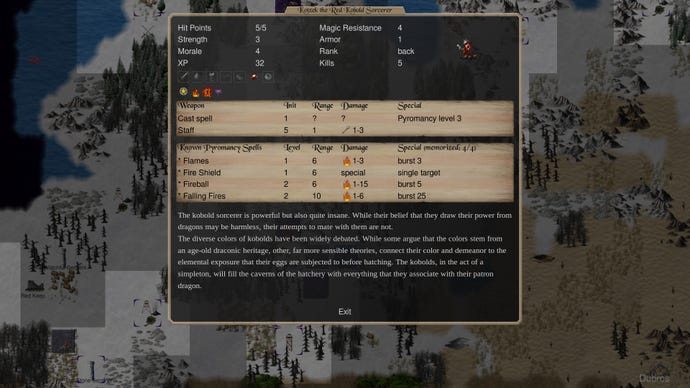
It's not just about army composition. Sure, some sides will swarm with cheap disposable fodder and others will try to weather those swarms with a small core of hoplites, or maybe a few giant regenerating beasts, or a wall of armoured scorpions. Yes, the absurd amount of spells available can dramatically alter many fights. But on top of that, each faction values different things on the map itself.
Before a game starts, you choose an era. This world was wild and teeming with dangerous wildlife, and then it was gradually settled. An empire rose, fell, splintered into kingdoms, then began to reform. Which era you pick defines how many neutral settlements there are, and how powerful both they and more wild forces will be. That matters a lot, because money comes primarily from occupying those settlements, and everyone uses at least some money.
But the other resources change things more. If you're a Bakemono side, you'll do well to capture lots of small hamlets, gathering sacrifices your mages can 'spend' on rituals to unlock more battlefield spells, and empower themselves to summon powerful demons, giving you the edge your slightly underpowered armies need to compete with the hardier sides. But those demons? They might be offended that you summoned them. You can adjust the number of sacrifices spent to do so, but even the RRP might not cut it, so instead of reinforcements you just teleported a pack of hostile immortals into your town. Oops. In some eras the empire might be too strong, so your game will mean marching down from the mountains to pick away at easy villages and farms instead of those fortified cities.
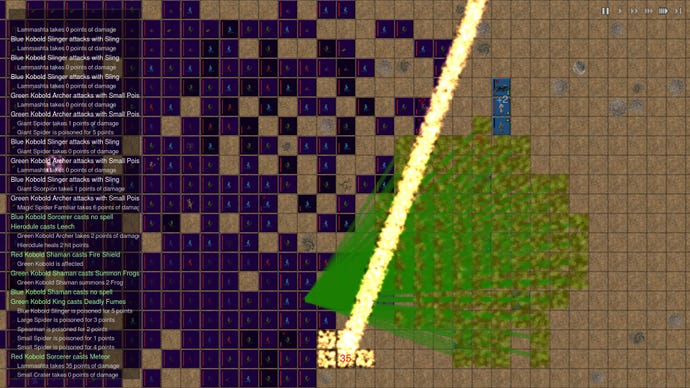
Barbarians, meanwhile, can't access sacrifices at all. Their soldiers are cheap and strong berserkers, capable of fighting through otherwise mortal blows. They gather herbs from any jungle, forest, or swamp square to power their rituals, and will have you sweeping through whole regions, terrorising all in your path, but also needing to control large amounts of wild territory to keep up. Wilder eras are doubled edged for barbarians: there's more land for herbs, but more dangerous animals and magic beasts taking it back from you too.
Holding land is extremely important in Elysium, since wandering forces are near impossible to expunge completely. Initially this is seems like a flaw, but it works to break you of the habit of putting everything into one massive army, instead forming multiple smaller ones to cover and protect more land. Over time you'll realise these are more effective anyway. Having 400 goblins just means the archers and spellcasters you need are too far back to do anything about the single swordproof enemy bastard feeling not one of your theoretical thousand cuts. All this adds up to a strong sense of roleplaying, as your units determine what you can do, and your unique resources what you value.
I didn't think I liked it, at first. It felt too faffy, too much like other games about manually marching armies back and forth, when the relatively simplicity of movement was one of the things I appreciated most about Dominions (even more so in Imperialism 2). But whenever I finished a game, I was immediately starting another one to try out another faction. Perhaps I'll be an enchanter, with the option to turn a mine on the map into a giant golem, gambling that whole source of resources against the chance that the irreparable behemoth will gain me far more before it inevitably falls. It reminds me of Warlords Battlecry 3, disdaining clinical, boring balance where flavour can do so much more.
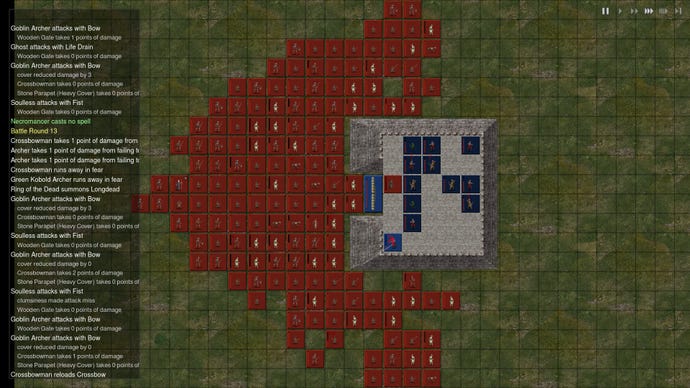
This time I might be a necromancer, coveting towns for their corpses, scavenging battlefields, occasionally marching a horde to ancient ruins in seek of more potent forms of undeath. Picture 14 archers in a tower approached by a shambling horde of zombies. The gates hold, but then a ghost floats through the wall, causing a total panic. It drains their lifeforce at its leisure while the soulless corpses beat down the door with their ragged fists. Another battle saw my strongest caster peak a rival necromancer off his tower with a Finger of Death spell, doing 824 damage where 10 would kill most men. It's the most like an evil death lord I've ever felt, and it wasn't even my decision. That's why they call him the Wight King, I guess.
Take the kobolds. They're so weak that their defence strategy is attracting dragons by offering them gold, and kobolds to eat. Even then, a dragon can't be led, and will periodically leave of its own accord to terrorise a nearby settlement. You need a kobold's mindset: lurking in your lair and casting divinations to find a mine that could become a new hatchery. With luck, you'll eventually gather kobolds of each of the five colours, giving you fodder who are immune to elemental attacks, letting them charge while your gem-enhanced sorcerers bathe the world in fire or poison. And then you'll bring your winged prophet home to prepare a war, using that teleport scroll you found to hurry the journey... which it turns out was cursed, and instead your prophet and her bodyguards are transported to Hades.
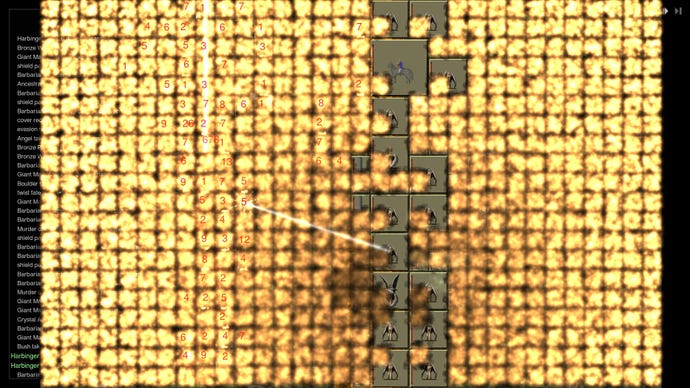
Yeah, see, you know how Master Of Magic had two realms to explore? Conquest Of Elysium has ten. And while that sounds like an overwhelming slog, they're often completely irrelevant. You don't even have to conquer the starting plane in fact, just kill off your rivals. But depending on your faction, your spells, your magic items, the era, and sheer chance, you could find yourself occupying cloud fortresses, tunneling below the earth, interrupted by an apocalyptic force spilling from a dimensional gate on the other side of the world, or desperately ferrying your dwindling party of plucky kobolds through the underworld as ghosts and ethereal warriors harass them from the shadows, hoping to find some way back home to rejoin your people for their final battle.
It could use some tweaking, still. The menus should be made opaque - inadvertently clicking through one cost me an entire game, and some of the summoning sound effects are annoying and deafening. The UI still requires a lot of manually mousing over tiles and units to get information that overlay options would make much smoother. In particular, finding magic items, identifying leaders in battle, and transferring units get needlessly difficult in larger armies.
I should be annoyed that these things are still a problem, but I've come to love Conquest of Elysium 5. It's somewhat less complicated than Dominions, and perhaps a little more orthodox in structure, but in exchange it often pulls me in even more. It feels less necessary to know things in advance, to have a structured plan or path through research and magic. There's more adventure and drama to it than to any of its closest kin, and I still feel like I've barely touched on everything it can do. It doesn't quite earn the place Dominions does in our best strategy games list, but it's a damn fine accompaniment.
